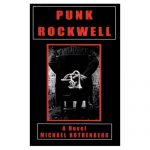 Punk Rockwell, by Michael Rothenberg. Review by Mary Woodbury.
Punk Rockwell, by Michael Rothenberg. Review by Mary Woodbury.
According to Punk Rockwell‘s narrator Jeffrey Dagovich, poetry takes more than a lifetime to write. Dagovich is a poet (he announces at the beginning of the book), not a novelist. So why is he writing a novel? Slowly, it’s revealed that he writes a novel–that mortal craft–to create, expose, and expel possibilities other than those found in his rather mundane and rhetorical life. He writes a novel to escape the immortality found in poetry.
His main character, Punk Rockwell, is a novelist–a pulp fiction writer. Rockwell is quickly satisfied and a now type of guy, unlike Dagovich, who’s quiet and moody, and likes to think about what to do next. Rockwell is, in fact, Dagovich’s alter-ego, and thusly so a spy–a random agent hired into Dagovich’s world. Punk plops into the novel seemingly straight from the sky (you know how heroes are), and lands into Dagovich’s dreamy environment: an isolated mountain cabin at which Jeffery and his wife Emily are camping and doing mushrooms. Punk likes Donne, which Jeffery is reading: the first clue that the two men have something in common. And Punk likes Emily, too.
Jeffrey muses:
It wasn’t until I’d built myself a nest out of bourgeois securities and ventured into the jungle of treasured nightmares that I met Punk Rockwell. Fluctuations, force of tide, moonlight, drifting, rippling outbound over oyster shell islands, sand spits–this caused a change. Rockwell carved a scar in my imagination that would keep me turning stones and deadwood until I became the snake I was looking for.
The storyline is built around a salty, lurid, and conceivably edible substance, which is to be shipped from Russia to the president of the United States as a gift, under the guise of a crate of caviar. This compound, developed in labs, struggles to reach its final destination. Jeffery, Emily, Punk, beautiful Angelina (a side-thought in Dagovich’s fantasy), and a few diplomats and killers play a role in the transference of this salty substance. The compound is not caviar, however. It is a mysterious element that might bring world peace, symbolically cure impotency, and make someone rich quickly. It is a tease, really.
Punk Rockwell is hyperprose, a sweeping ride that seems dangerous in its bloody international espionage, sexual encounters, and adventure. It is all in Dagovich’s mind, though, because he is probably sitting under a gigantic Redwood in the High Sierras staring into a blue sky, while he ponders his mortality.
Embedded within the tale are hints of extinction, based on Dagovich’s reality: he and his wife are ecologists and work to save species such as fruit bats, which pollinate half the flowers in the world. If Indonesians are going to eat all the fruit bats, there goes an entire ecosystem. Dagovich’s marriage, too, though not rocky, has reached the age of ho-humness. How to save fruit bats? How to repollinate his marriage?
It takes some manipulation to save endangered things. Dagovich’s saving grace is his ability wake up, after being blindfolded and gagged and ineffective, and open his eyes. He maneuvers happenstance by writing a book, and in doing so becomes the creator of Punk, similar to the way Kurt Vonnegut Jr. did with his character Kilgore Trout. What-ifs are boundless in Punk Rockwell, as Dagovich ventures outside himself to perceive what could be.
Meanwhile, he doesn’t lose too much of himself as far as art goes, even though he’s switching genres mid-life. Poetic strophes and phrases punctuate the novel. There are turns of phrase, metaphors, ironies, unexpecteds, analogies, aphorisms, and catchy images. There are absolutely no platitudes. Some examples:
“Punk worked for himself. He was a detective. A consultant. A shaman. He came to Emily, shook his wings over us.”
“A point. The Milky Way. Converging. Space shot Kerouac. Basho. Zado. Smoke from Punk’s chimney.
“I should be in Maui at the Cambell’s doing bullfrog imitations, dodging swollen mangoes in a valley stream. Lost. I’m lost, no one can find me. If I wanted to write a poem I couldn’t find a pen. The telephone is ringing somewhere.”
“Umbrellas were invented to leave behind.”
“God is a serpent crawling over eternity marsh. Counting stars and red-legged frogs.”
Punk Rockwell is a dreamscape. It cuts back and forth into time. It is the creator Dagovich’s REM that the reader will experience, eyelid movement and all, and the result is purely hot. This book is sexy, poetic, ecologically astute, and mind-twisting.
Punk Rockwell is also a hybrid of poetry and fiction — a mutation from fictional linearity that traditionally includes a definitive plot, expiation, and a predictable ending. It is not a raunchy read that Punk might write. It reaches beyond the limits of fiction as we know it, into the milky atmosphere where storytelling zig-zags, characters don’t necessarily find redemption, and predictable closure never happens. Upon finishing the book, the reader must go back to the beginning to see what happens next.
This book was published in 2000 and remains important today, 14 years later. See more at Amazon. The review was originally published at Jack Magazine under my maiden name Sands. The book might now be out of print, but used copies are available.